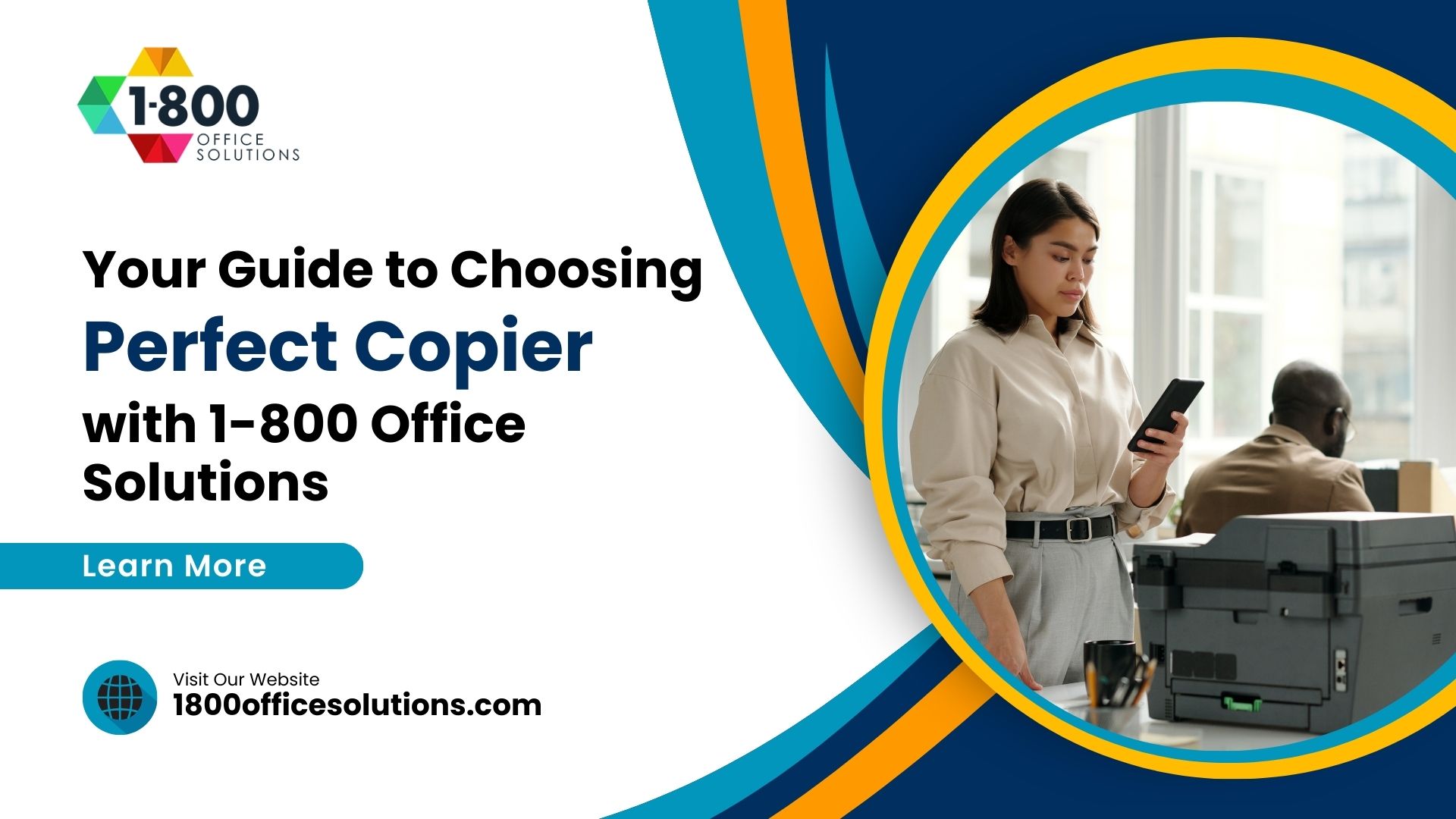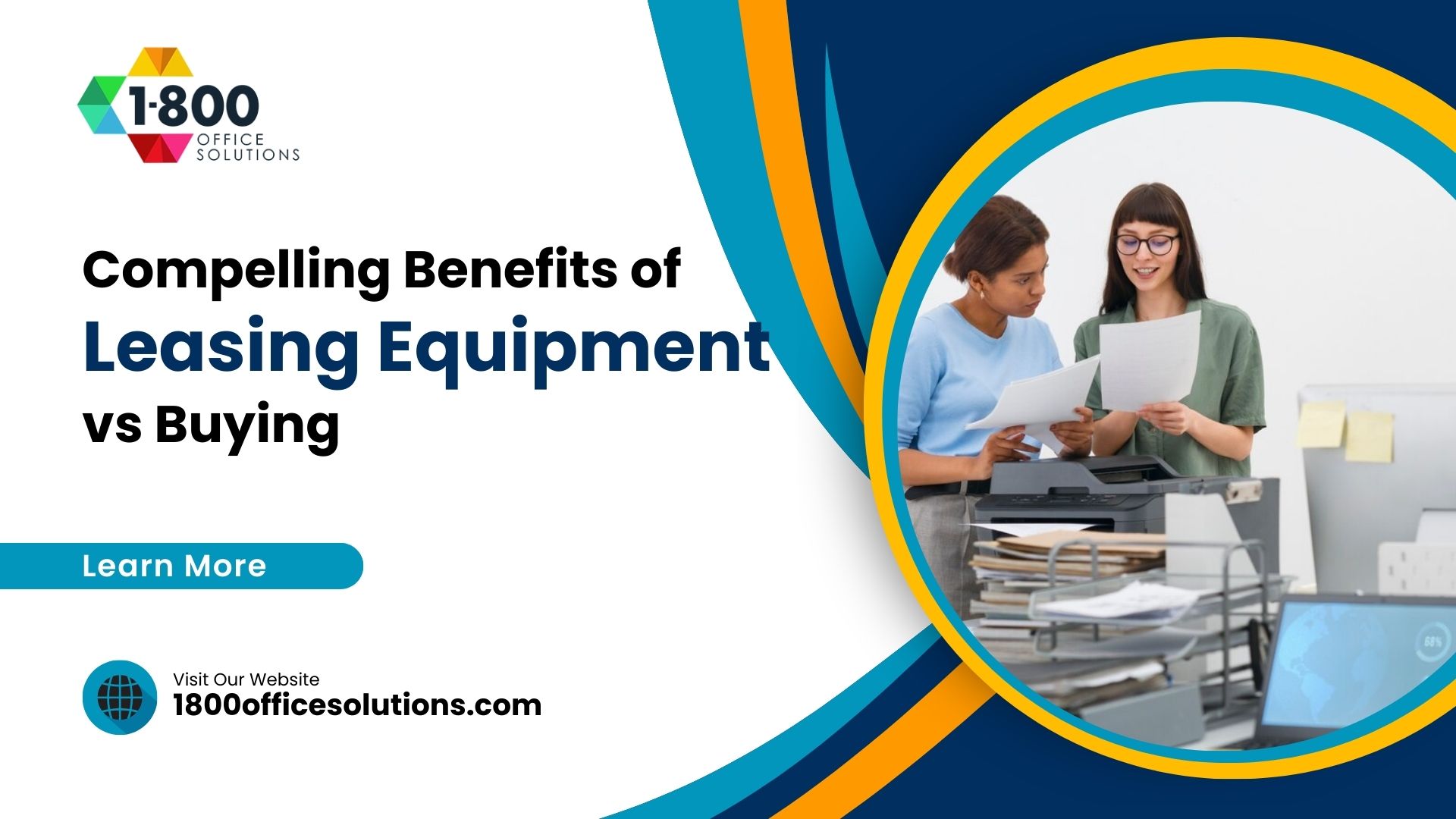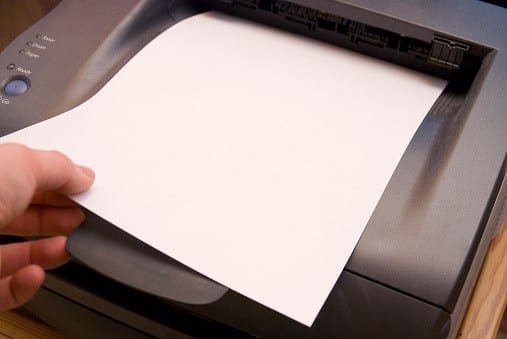Copy Machine Lease Mistakes: Are You Making These Common Errors?
Introduction to Copy Machine Leasing
In the world of business, copy machines play an integral role in maintaining efficient operations. They are essential for creating physical copies of important documents, facilitating communication, and ensuring smooth workflow. However, purchasing a copier outright can be a significant investment, especially for small businesses or startups. This is where copier leasing comes into play. In this blog post you’ll learn copy machine lease mistakes and how to avoid all these.
Leasing a copier is a cost-effective alternative that allows businesses to use up-to-date equipment without the hefty upfront cost. It involves a contractual agreement where the lessee (the business) pays the lessor (the leasing company) periodic lease payments to use the copier for a specified period. This arrangement not only helps manage cash flow but also provides access to the latest technology, as leases often include provisions for upgrades.
Understanding the terms of your lease agreement is crucial when you lease a copier. These agreements are legally binding documents that outline the responsibilities of both parties involved. They detail the lease term, payment amount and frequency, maintenance and service terms, and conditions for lease termination or renewal.
One of the key benefits of leasing is that it often includes a service agreement. This means that the leasing company is responsible for the maintenance and repair of the copier machine, reducing the burden on your business. However, it’s important to thoroughly understand these terms to avoid unexpected costs or service disruptions.
It’s also worth noting that lease agreements can have financial implications for your business. For example, lease payments are typically considered an operating expense and can be deducted from your taxable income. However, this can vary depending on the structure of the lease, so it’s always a good idea to consult with a financial advisor or accountant. Here’s a resource that provides more information on how to expense a copier lease in accounting.
Brief Overview of Common Mistakes
When entering a copier lease, businesses often make common mistakes that can lead to unnecessary costs or complications. These errors usually stem from a lack of understanding of the lease terms or neglecting to consider the long-term implications of the lease.
One of the most common mistakes is not reading the fine print of the lease agreement. This can lead to unexpected costs, such as early termination fees or automatic renewal clauses. It’s essential to review the agreement thoroughly and ask for clarification on any points you don’t understand.
Another common error is not considering the end-of-lease terms. At the end of the lease, you may have the option to purchase the equipment, return it, or continue leasing it. However, if you’re not prepared for this, you may end up paying for a printer you no longer need or want. This article provides more insight into what happens at the end of a copier lease.
Lastly, many businesses fail to negotiate the terms of their lease. While lease agreements may seem set in stone, there is often room for negotiation. This could involve adjusting the lease term, payment amount, or service terms to better suit your business’s needs.
In the following sections, we’ll delve deeper into these mistakes and provide advice on how to avoid them. By being aware of these common pitfalls, you can ensure that your copier lease supports your business’s operations and financial goals.
Common Copy Machine Lease Mistakes
Not Reading the Fine Print
One of the most common mistakes companies make when entering a copier lease is not reading the fine print. The details of the lease agreement are often overlooked, leading to unexpected costs and complications.
For example, some leasing companies include an automatic renewal clause in their contracts. This means that the lease will automatically renew for a specified term unless the lessee provides a termination notice a certain number of days before the end of the lease. If overlooked, this can lead to unwanted extensions of the lease and additional costs.
Another detail often missed in the fine print is the service agreement. Some leases include a service contract bundled with the lease agreement, covering maintenance and repairs. However, these agreements may have limitations, such as a maximum number of service calls per month or additional charges for parts and labor.
It’s also important to understand the terms related to the copier’s usage. Some leases have a limit on the number of copies that can be made per month, with additional charges for exceeding this limit. Others may have stipulations about the type of paper or toner that must be used, with penalties for non-compliance.
Overlooking the Lease Term
The lease term is another critical aspect of a copier lease that is often overlooked. This is the length of time that you agree to lease the copier, typically ranging from 12 to 60 months. Overlooking the lease term can lead to a mismatch between your business needs and the lease agreement.
For example, if your business is rapidly growing, a short-term lease may be more suitable as it allows for more flexibility to upgrade or change equipment. On the other hand, a long-term lease may be more cost-effective for stable businesses with predictable copying needs.
It’s also important to consider the timing of the lease. If your current lease is about to expire, you may be tempted to quickly sign a new lease to avoid disruption. However, rushing into a new lease without thoroughly reviewing the terms can lead to unfavorable conditions or costs.
Ignoring Maintenance and Service Terms
Maintenance and service terms are another area where many companies fall short. A copier’s performance can significantly impact your business operations, so it’s crucial to understand who is responsible for maintaining and servicing the machine.
In many cases, the copier dealer will include a service contract in the lease agreement. This contract typically covers routine maintenance, repairs, and replacement parts. However, it’s important to understand exactly what is covered under this contract. For example, are consumables like toner and paper included? How quickly will the dealer respond to service requests? What are the charges for service calls?
Ignoring these terms can lead to unexpected costs and downtime. For example, if your copier breaks down and your lease doesn’t include service coverage, you could be on the hook for costly repairs. Similarly, if the dealer’s response time is slow, your business operations could be disrupted.
Not Considering the End of Lease Terms
Another common mistake is not considering the end of lease terms. These terms outline what happens when the lease ends, including options to purchase the equipment, return it, or extend the lease.
Many businesses are surprised to find that they are responsible for shipping the copier back to the dealer at the end of the lease. These shipping fees can be substantial, especially for large copiers. Some leases also include a buyout option, which allows you to purchase the copier at the end of the lease for its fair market value (FMV). However, this amount can be higher than expected, especially if the copier has retained its value.
Neglecting to Negotiate
Many businesses don’t realize that copier lease terms are often negotiable. By neglecting to negotiate, you could be leaving money on the table or agreeing to unfavorable terms.
For example, you may be able to negotiate a lower monthly payment by extending the lease term or making a larger upfront payment. You could also negotiate the inclusion of a service contract, or better terms for the end-of-lease options.
Remember, the leasing company wants your business. Don’t be afraid to ask for better terms or shop around for the best deal.
Failing to Understand the Type of Lease
Finally, many businesses fail to understand the type of lease they are entering. There are two main types of leases: capital leases and operating leases.
A capital lease is similar to a loan. The lessee assumes the risks and benefits of ownership, and the copier is considered an asset on the balance sheet. At the end of the lease, the lessee typically has the option to purchase the copier for a nominal amount.
An operating lease, on the other hand, is more like a rental agreement. The lessee does not assume the risks and benefits of ownership, and the copier is not considered an asset on the balance sheet. At the end of the lease, the lessee typically returns the copier to the lessor.
Understanding the type of lease you are entering can have significant financial implications. For example, a capital lease may allow for depreciation deductions, while an operating lease may offer lower monthly payments.
In conclusion, while leasing a copier can offer many benefits, it’s crucial to avoid these common mistakes. By reading the fine print, understanding the lease term, considering maintenance and service terms, thinking about the end of lease terms, negotiating, and understanding the type of lease, you can ensure a favorable agreement that meets your business needs.
What People Also Ask
What happens at the end of a copier lease?
At the end of a copier lease, you typically have three options: return the copier, purchase it, or renew the lease. The specific terms will be outlined in your copier lease agreement. If you choose to return the copier, you may be responsible for shipping fees. If you decide to purchase, the price will usually be the copier's fair market value. If you choose to renew, you'll enter a new lease agreement, potentially with updated terms and conditions.
How does a copier lease work?
A copier lease works much like a rental agreement. You, the lessee, agree to make regular payments to the lessor (the copier company) for the use of the copier. The term of the lease can vary, but it's typically between 12 and 60 months. The lease agreement will also outline other terms, such as maintenance and service responsibilities, what happens at the end of the lease, and any conditions for early termination.
What should I look for in a copier lease?
When looking at a copier lease, it's important to consider several factors. First, understand the total cost, including monthly payments, service fees, and potential end-of-lease costs. Second, check the lease term to ensure it aligns with your business needs. Third, review the maintenance and service terms. Fourth, consider the copier's features and whether it meets your office's needs. Lastly, understand the end-of-lease terms, including return, purchase, and renewal options.
How can I negotiate a copier lease?
Negotiating a copier lease can help you secure better terms and potentially save money. Start by understanding your business needs and budget. Then, research various copier companies and their offerings.
Don't be afraid to ask for adjustments to the lease terms, such as the payment amount, lease term, or end-of-lease options. Remember, everything can be negotiated - from the price of the copier to the length of the lease and the service contract. It's also a good idea to have a lawyer or experienced professional review the contract before signing.
Conclusion
In this article, we’ve explored the common mistakes businesses often make when entering a copier lease. These include not reading the fine print, overlooking the lease term, ignoring maintenance and service terms, not considering the end of lease terms, neglecting to negotiate, and failing to understand the type of lease. By being aware of these potential pitfalls, businesses can make informed decisions and avoid costly errors.
Leasing a copier can be a cost-effective solution for businesses, providing access to the latest technology without the upfront cost of purchasing. However, it’s crucial to approach copier leasing with a clear understanding of the terms and potential pitfalls.
Always read the lease agreement thoroughly, understand your responsibilities, and don’t hesitate to negotiate for better terms. Remember, the goal is to secure a lease that aligns with your business needs and budget.
Finally, consider seeking advice from a legal or financial professional before signing a lease agreement. They can provide valuable insight and help you navigate the complexities of copier leasing.
By avoiding these common copier leasing mistakes, you can ensure that your copier lease supports your business’s operational and financial goals. For more information on Copy Machine Lease Mistakes, here’s a contact that provides more insight into common mistakes to avoid.












